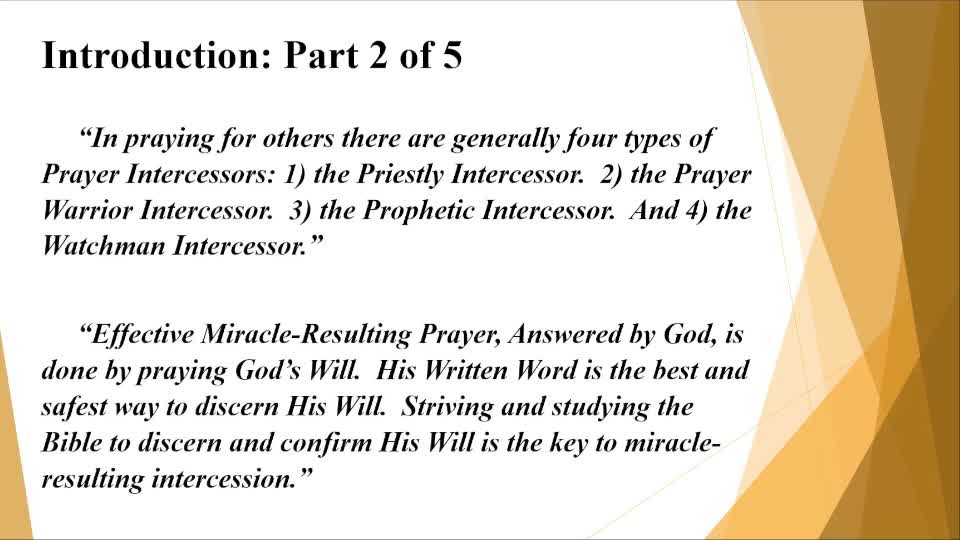Premium Only Content

Intro Part 2 of 5 012922 -- Intercessor Types & Praying God's Will
This video/presentation seeks to contribute to the free marketplace of ideas and is for educational purposes.
You are free to agree or disagree with its comments, concepts, and conclusions concerning the Word of God, life, geo-political events, etc.
Think for yourself. Do your own research. And then look to your own internal moral compass to what’s right and wrong. 1 Corinthians 2:9-16. Then use your God-given free will to decide for yourself.
Fair Use of Copyright: This video/presentation may also use the copyrighted material of others. Generally this cannot be done without the consent of its copyright owner. However Section 107 of the US Copyright Act allows for this under the Fair Use doctrine. Fair Use is the legal, non-licensed inclusion of copyrighted materials into one’s own material if done for educational, commentary, criticism, news reporting, teaching, scholarship, research, or transformative purposes.
Manuscript of this Video's Text:
Bible
Prayer Intercession &
Spiritual Warfare
January 29th, 2022
Post
Introduction: Part 2 of 5
“In praying for others there are generally four types of Prayer Intercessors: 1) the Priestly Intercessor. 2) the Prayer Warrior Intercessor. 3) the Prophetic Intercessor. And 4) the Watchman Intercessor.”
“Effective Miracle-Resulting Prayer, Answered by God, is done by praying God’s Will. His Written Word is the best and safest way to discern His Will. Striving and studying the Bible to discern and confirm His Will is the key to miracle-resulting intercession.”
“4 Types of
Intercessors”
The 1st type of prayer intercessor is the PRIESTLY INTERCESSOR. This intercessor pleads before God’s Throne on behalf of others to secure God’s relief against the (often dire) situations confronting these other persons. Scriptural examples of this are 1 Timothy 2:1, Romans 8:26-27, Job 42:8, Ephesians 6:18, and 1 Samuel 12:23.
The 2nd type of prayer intercessor is the PRAYER WARRIOR INTERCESSOR. This intercessor receives God’s warfare strategies and tactics, to be launched against demons, fallen angels, Nephilim, and Satan -- often by surprise. After the Lord has revealed reconnaissance on what the enemy is doing, this intercessor specifically addresses and militantly commands these darkness entities in the Name of Jesus, according to the Word of God, and by the Blood of The Lamb. This is not just defensive but offensive spiritual warfare so as to devastate and utterly demoralize the dark spiritual forces involved. Scriptural examples of this are Luke 10:18-20, Matthew 17:20, Psalm 149:5-9, 1 Samuel 17:40-54, Joshua the 6th Chapter, Mark 5:1-13, and Matthew 16:18-19.
The 3rd type of prayer intercessor is the PROPHETIC INTERCESSOR. This intercessor speaks/prays only what Heaven is speaking. This intercessor reads Heaven’s “sonogram” in the spiritual realm of what God wants to birth into the Earthly realm, and by so speaking it sets in motion spiritual and natural forces such that those plans of God physically come to pass. These include the big plans of God of historic/epic proportions like Jeremiah 29:11-14, the 9th through 11th Chapters of Daniel, and the 41st Chapter of Genesis. Scriptural examples of this are Amos 3:7, Luke 2:36-38, and Matthew 6:9-10.
And the 4th type of prayer intercessor is the WATCHMAN INTERCESSOR. These build spiritual hedges in the realm of the spirit to guard and protect individuals, regions, and nations. These intercessors also protect our futures and the destinies God has planned for us, by preserving/watching for the coming of “nobility” – i.e., the future Moves of God. This intercessor also spots very afar off any kingdom of darkness spirits seeking to stop God’s move, and will then block such spirits. Because of this intercessor’s spiritual farsightedness, the intercession will tend to be proactive in nature. Scriptural examples of this are Isaiah 37:21-38, Genesis 18:17-33, and Isaiah 62:5-12.
“Prayer is the conduit through which the purposes of God are birthed in the Earth realm.” Domanique Johnson.
In this video, Domanique discusses these four intercessor types.
A video 01/16/2017 link to Domanique’s discussion on the “4 Types of Intercessors” is provided in our description box below. {https://www.youtube.com/watch?v=rwtYCna1bx8 – Domanique Johnson 01/16/2017 “4 Types of Intercessors”.}
Speaking and praying what is God’s Will is the “secret” that causes our prayers to result in miracles.
Notice that:
God’s Will is a major component in the Lord’s Prayer. Matthew 6:10. Luke 11:2.
Praying God’s Will is what gives us the confidence that God has heard us – and if He has heard us, we then know that He has granted what we asked Him. 1 John 5:14-15.
Discerning God’s Will -- is best and most safely done by consulting His written word. His written word is the yardstick by which we must judge our experiences and what we physically see. We must not do the reverse – i.e., judge the Word of God by what we experience, see, or feel.
This is easier said than done -- but we must still CHOOSE to believe God just because He said so. This is why we’re called BELIEVERS.
The challenge is that the Bible most of us read today is a translation of ancient languages of which we are unfamiliar. And the Bible was written within historical contexts and societal settings about which we know little. Certainly God wrote His Word FOR us, but the historical human vessels whom He used did not write it TO us.
Those human vessels wrote instead to their contemporary readers of their time. Both these writers and readers had historical backgrounds and cultural contexts that gave them the ability to more immediately grasp the point of the informative styles, colloquies, adages, and expressions of their time, which we must now strive to understand thousands of years later.
This does not make it impossible for us to discern God’s Will from the written text of His Word – but it does require us to learn and be more than just a casual and careless reader of Scripture.
And thank God that He has given us The Mind of Christ (1 Corinthians 2:9-16) and that because of our Born-Again family relationship we are related to and know The Author Himself. Plus, “if any man lacks wisdom . . .” James 1:5-8.
So with God’s help, there are two things that I’ve found useful in my efforts to carry out the Apostle Paul’s advice in 2 Timothy 2:15, to rightly divide the word of truth and be “a workman that needeth not to be ashamed” – although I also expect of course to be always “a work in progress”:
FIRST, to at least look up the key words in a Scripture, in their original language.
SECOND, to explore and try to read the Scriptural passage in the way the historical contemporary readers would have read it when the biblical writer wrote this Scripture.
As for reading (key words) in Scripture in their original language, this brief video by Dr. Michael S. Heiser explains why this is helpful.
A video 01/10/2022 link to Dr. Heiser’s discussion “Why You SHOULD Read the Bible in its Original Languages” is provided in our description box below. {https://www.youtube.com/watch?v=rlgVPtAfaF8 – Dr. Michael S. Heiser 01/10/2022 “Why You SHOULD Read the Bible in its Original Languages.}
As for reading Scripture as the readers contemporary at the time its Biblical writer wrote it -- Dr. Heiser makes this point:
“We talk a lot about interpreting the Bible in context, but Christian history is not the context of the biblical writers. The proper context for interpreting the Bible is not Augustine or any other church father. It is not the Catholic Church. It is not the rabbinic movements of late antiquity and the Middle Ages. It is not the Reformation or the Puritans. It is not evangelicalism in any of its flavors. It is not the modern world at all, or any period of its history.
“The proper context for interpreting the Bible is the context of the biblical writers – the context that produced the Bible. Every other context is alien to the biblical writers and, therefore, to the Bible. See Footnote 1. Yet there is a pervasive tendency in the believing Church to filter the Bible through creeds, confessions, and denominational preferences. (Footnote 1. We do not share the cognitive framework of the biblical writers. While the implications may seem uncomfortable, it is hermeneutically pointless to pretend otherwise. See the companion website [www.theunseenrealm.com] for examples of resistance to this transparently obvious fact. )
“I’m not arguing that we should ignore our Christian forefathers. I’m simply saying that we should give their words and their thought the proper perspective and priority. Creeds serve a useful purpose. They distill important, albeit carefully selected, theological ideas. But they are not inspired. They are no substitute for the biblical text.
“The biblical text was produced by men who lived in the ancient Near East and Mediterranean between the second millennium BC and the first century AD. To understand how biblical writers thought, we need to tap into the intellectual output of that world. A vast amount of that material is available to us thanks to modern technology. As our understanding of the worldview of the biblical writers grows, so does our understanding of what they intended to say – and the mosaic of their thinking takes shape in our minds.”
Michael S. Heiser, THE UNSEEN REALM: RECOVERING THE SUPERNATURAL WORLDVIEW OF THE BIBLE 16 (2015).
By way of a parable, think of written Scripture as akin to your employment contract. That is not a document you want someone to finagle with intentionally or innocently -- least your employment responsibilities and job burdens be added-to, and your pay and benefits cut.
Instead you want your employment contract as originally negotiated, understood, and finally set down on paper. So with an employer of mine, the union printed up the final contract, and gave an official hardcopy of it to every employee, to keep and read for themselves.
Seeking to study the Bible so as to better understand what God is really saying will require work and devotion on your part.
And that effort and study may even arouse the ire and opposition of those who profit -- either physically or in the cosmic sense -- from your ignorance of the Will of God.
This ire Martin Luther faced when he stood up for his scholarly and biblical stance (among others) -- that ordinary people should be allowed to read the Bible for themselves, and that salvation was the free gift of God only obtainable by faith and not works.
In 1521 (i.e., 501 years ago today as of 2022) Martin Luther was put on trial to face the death penalty unless he renounced his stance.
A 2016 link to a video depiction of his trial where he refused, and announced “Here I Stand,” is provided in our description below.
{https://www.youtube.com/watch?v=9IkqniF8AA8 – Mikhael Corley 2016 “Here I Stand”}
God Bless you all,
Papa-FortySevenDelta
01/29/2022
-
 7:05:23
7:05:23
Hevel Gaming
13 hours ago $38.15 earnedNCAAF Tennessee at Georgia While with Heroes of Might and Magic III & Helldivers 2
95.9K18 -
 6:34:08
6:34:08
MissesMaam
11 hours agoI'm Addicted | Sons of the Forest 💚✨
61.3K21 -
 11:22:12
11:22:12
a12cat34dog
14 hours agoALMOST HAVE ALL GUNS DIAMOND :: Call of Duty: Black Ops 6 :: SO MANY ZOMBIES CAMOS {18+}
48.7K -
 3:32:31
3:32:31
United Fight League
15 hours agoUFC 309 Watch Party w/ Rampage Jackson, Maycee Barber, Demi Bagby, and Harrison Rogers
110K8 -
 2:35:52
2:35:52
Jewels Jones Live ®
1 day agoELECTION OVER - LIES CONTINUE | A Political Rendezvous - Ep. 100
33.3K69 -
 3:59:18
3:59:18
GamerGril
17 hours agoPAGING ALL ZOMBOIZ | DEAD ISLAND 2
130K20 -
 42:24
42:24
MYLUNCHBREAK CHANNEL PAGE
1 day agoA Century Gone
154K131 -
 38:22
38:22
Stephen Gardner
18 hours ago🔥HOLD ON! The RUMORS about Kamala are TRUE...
195K542 -
 1:22:44
1:22:44
Michael Franzese
1 day agoWill Trump’s Win Finally Convince Democrats to Stop The Woke Nonsense??
177K158 -
 8:27:07
8:27:07
MDGgamin
21 hours ago🔴LIVE- Rumble Gaming To The MOON - Variety of Games & Chatting - #RumbleTakeover
154K5